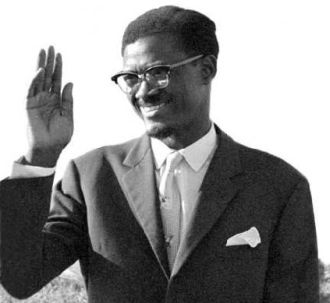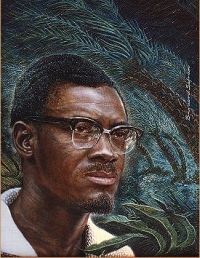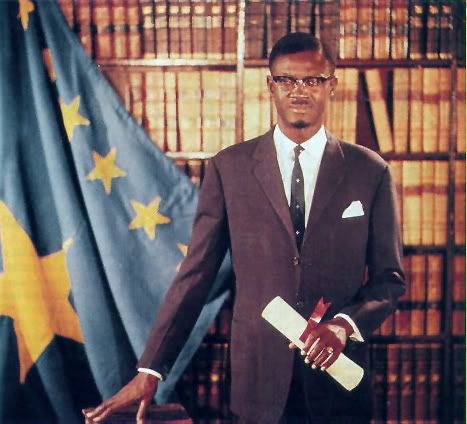
Publisher:
Bonnie King
CONTACT:
Newsroom@Salem-news.com
Advertising:
Adsales@Salem-news.com

~Truth~
~Justice~
~Peace~
TJP
Jan-17-2011 15:43

 TweetFollow @OregonNews
TweetFollow @OregonNews
Fiftieth Anniversary of U.S. Orchestrated Assassination of Congo's Patrice Lumumba
Ralph E. Stone Salem-News.comWe will never know what would have happened in the Congo or Africa or elsewhere if he had survived. But the United States saw to it that he never had a chance.
 Courtesy: politicsafrica.com |
(SAN FRANCISCO) - This month marks the fiftieth anniversary of the assassination of Patrice Émery Lumumba, a Congolese independence leader and the first legally elected Prime Minister of the Republic of the Congo after he helped win its independence from Belgium in June 1960.
 |
Ten weeks later, the United States helped orchestrate a coup of Lumumba's government. Lumumba was then imprisoned and murdered.
In our various trips through a number of African countries, we now better understand the terrible legacy of Western colonialism. In 2002, we saw the docudrama Lumumba www.imdb.com/title/tt0246765 in Cape Town, South Africa. Lumumba is an excellent depiction of this interference. Fittingly, at the same time the movie was showing to sizeable crowds, South Africa was mediating the internecine dispute between the Congolese government and rebel factions.
Lumumba was elected prime minister of a coalition-government prime minister of the Congo. It was the first democratic national election the territory had ever had. Lumumba believed that political independence was not enough to free Africa from its colonial past; it had to cease being an economic colony of Europe. His fiery speeches immediately alarmed the West.
Why?
Because Belgium, British, and American corporations had vast investments in the Congo, which was rich in copper, cobalt, diamonds, gold, tin, manganese, and zinc. An inspired orator, his message was being heard beyond Congo's borders. Western governments feared his message would become contagious to other African countries. And Lumumba could not be bought. Finding no allies in the West, he sought assistance from the Soviet Union. Thus, his days became numbered.
 |
Less than two months after his election as prime minister, a U.S. National Security Council subcommittee on covert operations, which included CIA chief Allen Dulles, authorized his assassination. Richard Bissell, CIA operations chief at the time, later said, "The President [Dwight D. Eisenhower] would have preferred to have him taken care of some way other than by assassination, but he regarded Lumumba as I did and a lot of other people did: as a mad dog . . . and he wanted the problem dealt with."
Alternatives were debated for dealing with "the problem," among them poison (a supply of which was sent to the CIA station chief in Leopoldville), a high-powered rifle, and free-lance hit men. But it was hard to get close enough to Lumumba to use these, so, instead, the CIA supported anti-Lumumba elements within the factionalized Congo government, confident that before long they would do the job. They did. After being arrested and suffering a series of beatings, the prime minister was secretly shot in Elizabethville in January 1961. A CIA agent ended up driving around the city with Lumumba's body in his car's trunk, trying to find a place to dispose of it.
We will never know what would have happened in the Congo or Africa or elsewhere if he had survived. But the United States saw to it that he never had a chance. Instead, he ended up in an unmarked grave.
Joseph Desiree Mobutu, then chief of staff of the army and a former NCO in the old colonial Force Publique, was the key figure in the Congolese forces that arranged Lumumba's murder. The Western powers had spotted Mobutu as someone who would look out for their interests. He had received cash payments from the local CIA man and Western military attaches while Lumumba's murder was being planned. He later met President Kennedy at the White House in 1963. Kennedy gave him an airplane for his personal use -- and a U.S. Air Force crew to fly it for him. With United States encouragement, Mobutu staged a coup in 1965 that made him the country's dictator.
Mobutu remained dictator until rebel leader Laurent Kabila seized control of the country in 1997.
How often before and since Lumumba assassination has the United States marshaled its forces of "good" to crush the "forces plotting against us" around the world? Will we ever learn?
Adam Hochschild's, King Leopold's Ghost, at pp.301-302 (Houghton Mifflin Co. 1988), is the source of this brief summary of of Lumumba's assassination.
 Salem-News.com writer Ralph E. Stone was born in Massachusetts. He is a graduate of both Middlebury College and Suffolk Law School. We are very fortunate to have this writer's talents in this troubling world; Ralph has an eye for detail that others miss. As is the case with many Salem-News.com writers, Ralph is an American Veteran who served in war. Ralph served his nation after college as a U.S. Army officer during the Vietnam war. After Vietnam, he went on to have a career with the Federal Trade Commission as an Attorney specializing in Consumer and Antitrust Law. Over the years, Ralph has traveled extensively with his wife Judi, taking in data from all over the world, which today adds to his collective knowledge about extremely important subjects like the economy and taxation. You can send Ralph an email at this address stonere@earthlink.net
Salem-News.com writer Ralph E. Stone was born in Massachusetts. He is a graduate of both Middlebury College and Suffolk Law School. We are very fortunate to have this writer's talents in this troubling world; Ralph has an eye for detail that others miss. As is the case with many Salem-News.com writers, Ralph is an American Veteran who served in war. Ralph served his nation after college as a U.S. Army officer during the Vietnam war. After Vietnam, he went on to have a career with the Federal Trade Commission as an Attorney specializing in Consumer and Antitrust Law. Over the years, Ralph has traveled extensively with his wife Judi, taking in data from all over the world, which today adds to his collective knowledge about extremely important subjects like the economy and taxation. You can send Ralph an email at this address stonere@earthlink.net
Articles for January 16, 2011 | Articles for January 17, 2011 | Articles for January 18, 2011





Quick Links
DINING
Willamette UniversityGoudy Commons Cafe
Dine on the Queen
Willamette Queen Sternwheeler
MUST SEE SALEM
Oregon Capitol ToursCapitol History Gateway
Willamette River Ride
Willamette Queen Sternwheeler
Historic Home Tours:
Deepwood Museum
The Bush House
Gaiety Hollow Garden
AUCTIONS - APPRAISALS
Auction Masters & AppraisalsCONSTRUCTION SERVICES
Roofing and ContractingSheridan, Ore.
ONLINE SHOPPING
Special Occasion DressesAdvertise with Salem-News
Contact:AdSales@Salem-News.com
Terms of Service | Privacy Policy
All comments and messages are approved by people and self promotional links or unacceptable comments are denied.
[Return to Top]
©2025 Salem-News.com. All opinions expressed in this article are those of the author and do not necessarily reflect those of Salem-News.com.